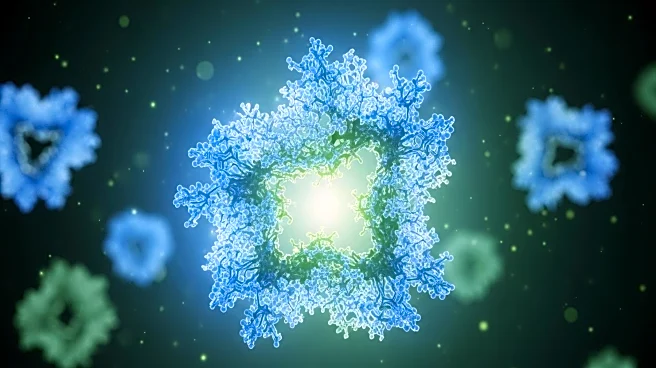What's Happening?
Scientists at the La Jolla Institute for Immunology (LJI) have successfully mapped the three-dimensional structure of a protein from human endogenous retroviruses (HERVs), specifically the HERV-K Env protein. This protein, which constitutes part of the 'dark matter' in human DNA, is a remnant from ancient viral infections that have integrated into the human genome. The study, published in Science Advances, marks the first time a human HERV protein structure has been solved, providing insights into its role in modern diseases. The HERV-K Env protein is found on the surface of certain tumor cells and in patients with autoimmune and neurodegenerative diseases, making it a potential target for new diagnostic and therapeutic strategies.
Why It's Important?
The discovery of the HERV-K Env protein structure is significant as it opens new avenues for medical research and treatment. Understanding this protein's structure could lead to the development of novel diagnostics and therapies for diseases where these proteins are active, such as cancer and autoimmune disorders. The ability to target HERV-K Env proteins with antibodies could help distinguish cancerous cells from healthy ones, offering a new strategy for cancer immunotherapy. Additionally, this research could aid in understanding autoimmune diseases, where the immune system mistakenly attacks the body's own cells, potentially leading to new treatments that mitigate harmful inflammation.
What's Next?
Future research will likely focus on leveraging the structural insights of HERV-K Env to develop specific antibodies that can target these proteins in disease contexts. This could lead to the creation of new diagnostic tools and therapies for cancers and autoimmune diseases. Scientists may also explore the role of HERV-K Env in other diseases, expanding the potential impact of this discovery. Continued investigation into the interaction between these viral proteins and the human immune system could further enhance our understanding of their role in health and disease.
Beyond the Headlines
The study of HERV-K Env proteins also touches on broader themes in human biology, such as the evolutionary history of viruses and their integration into the human genome. This research highlights the complex relationship between humans and viruses, suggesting that viral elements have played a significant role in shaping our genetic makeup. The findings could lead to a deeper understanding of how ancient viral infections have influenced human evolution and continue to impact health today.









